|
|
|
Sort Order |
|
|
|
Items / Page
|
|
|
|
|
|
|
| Srl | Item |
| 1 |
ID:
097918
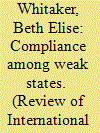

|
|
|
|
|
| Publication |
2010.
|
| Summary/Abstract |
This article examines levels of compliance with the counter-terrorism regime in Africa, where weak states might have been expected to conform. Instead, even under American pressure, some governments have seized the anti-terrorism rhetoric while others have been more reluctant. A comparative analysis of Kenya, Tanzania, and Uganda demonstrates that domestic political factors largely explain this variation; compliance is highest in countries with the least democratic institutions and minimal mobilisation of domestic constituencies. Aid dependence and the perception of a terrorist threat also play a role. To the extent that popular pressures in transitional democracies reduce compliance, the article raises questions about the legitimacy and effectiveness of the counter-terrorism regime.
|
|
|
|
|
|
|
|
|
|
|
|
|
|
|
|
| 2 |
ID:
178094
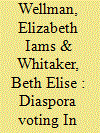

|
|
|
|
|
| Summary/Abstract |
In 2010, Kenya extended voting rights to its estimated 3,000,000 citizens living abroad, thus joining a growing number of countries in Africa and around the world to recognize emigrant voting rights. Yet despite a politically engaged diaspora, intensive government outreach to emigrants, and high-stakes electoral competition, fewer than 3,000 Kenyans were permitted to vote from abroad in the 2013 and 2017 presidential elections. What explains the failure of the Kenyan government to implement diaspora voting on a broader scale? Drawing on original interviews and archival documents, this article analyses the tumultuous battle over the adoption and implementation of external voting in Kenya, focusing especially on legal, logistical, and political challenges. We argue that uncertainty about the number of Kenyan emigrants and their political preferences, paired with a highly competitive electoral climate, meant there was little political will to push for more widespread implementation of diaspora voting. Our analysis of external voting in Kenya has implications for diaspora participation in other competitive electoral contexts across the continent and beyond.
|
|
|
|
|
|
|
|
|
|
|
|
|
|
|
|
| 3 |
ID:
078942


|
|
|
|
|
| Publication |
2007.
|
| Summary/Abstract |
Since 2001 many countries have adopted anti-terrorism laws that limit civil liberties and expand law enforcement powers in the name of national security. Counter-terrorism legislation is promoted through several international channels, most notably the United Nations Counter-Terrorism Committee, but the USA is clearly seen as the driving force. This article examines the politics surrounding the recent development and implementation of anti-terrorism laws in the Third World and the implications for ongoing processes of democratisation. In some countries the adoption of anti-terrorism laws has provided leaders with the tools they need to silence critics and punish political opponents. In others the introduction of such bills has actually encouraged debate and fostered civil society activism, much of it anti-American in tone. In either setting the Bush administration's twin foreign policy goals of strengthening international security and promoting democracy may be creating more cynics than friends.
|
|
|
|
|
|
|
|
|
|
|
|
|
|
|
|
| 4 |
ID:
081552
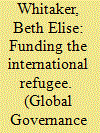

|
|
|
|
|
| Publication |
2008.
|
| Summary/Abstract |
Despite the abundance of literature on international regimes, little attention has been given to how they are funded and the impact of funding on regime performance. This article examines how donor funding has affected the underlying principle of protection in the international refugee regime. It focuses on the case of Tanzania, where refugee protection standards have declined consistently over the past twelve years, and argues that a shortage of funding within the regime has contributed to the shift in government policy in several ways. To the extent that funding cuts have had an influence on declining protection standards, this case suggests that resource shortages may cause practice within an international regime to become inconsistent with its underlying principles, thus weakening the overall regime
|
|
|
|
|
|
|
|
|
|
|
|
|
|
|
|
| 5 |
ID:
084669
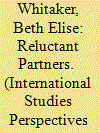

|
|
|
|
|
| Publication |
2008.
|
| Summary/Abstract |
Do fighting terrorism and promoting democracy go together, as policy makers suggest, or do they conflict in practice? This paper explores these dynamics in the case of Kenya, a transitional democracy that has been the victim of several terrorist attacks. Based on an examination of recent areas of cooperation and contention between the United States and Kenya, the paper argues that democratic pressures can make it difficult for newly elected governments to cooperate publicly in the "war on terror," though private cooperation often continues behind the scenes. This suggests the need for an approach among American policy makers that recognizes the domestic political constraints faced by foreign partners and seeks common ground between internal and external priorities. While the goals of promoting democracy and fighting terrorism may conflict in the short term, the development of shared democratic values could pave the way for closer partnerships in the future.
|
|
|
|
|
|
|
|
|
|
|
|
|
|
|
|
| 6 |
ID:
099561
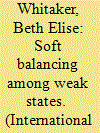

|
|
|
|
|
| Publication |
2010.
|
| Summary/Abstract |
Recent literature on the use of soft balancing to counter the hegemony of the United States has focused primarily on middle powers in Europe and rising powers such as China. But what about weak states? Do they simply go along with the hegemon, or do they challenge its policies despite the odds? And to what extent does the soft balancing argument explain their behaviour? In recent years, several historically friendly African countries have used non-military means to undermine the unilateral policies of the United States. Leaders in South Africa, Kenya, Nigeria, Tanzania, Mali, Namibia and Niger especially have resisted US demands in areas such as the 'war on terror', the International Criminal Court and the US Africa Command. This article seeks to explain the strategies of opposition that some African countries have pursued. It finds that the behaviour is driven both by regional power concerns and by domestic political considerations. Interestingly, public opinion in these relatively democratic countries is motivated by disagreements with US policy and by resentment of the predominance of American power. Thus, the evidence both confirms and challenges the notion of soft balancing. On one hand, the behaviour of African states is driven at least in part by the global balance of power-directly, as leaders respond to power concerns within the continent, and indirectly, as citizens pressure leaders to resist the hegemon. On the other hand, these findings challenge the underlying premise that state behaviour is determined solely by structural concerns. Instead, the oppositional behaviour of African states has both systemic and domestic explanations.
|
|
|
|
|
|
|
|
|
|
|
|
|
|
|
|
|
|
|
|
|